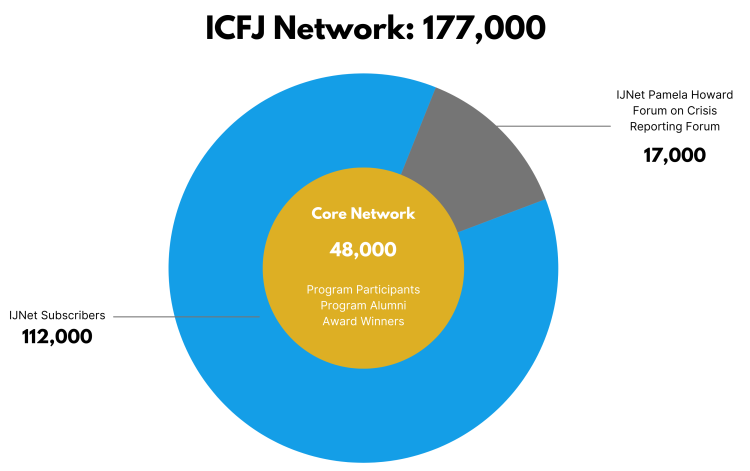Journalists in every corner of the world have received support from ICFJ since the organization was founded 40 years ago.
They include reporters, editors and producers, as well as people on the business side of media, technologists working on media innovation, journalism faculty and students, and representatives of our partner organizations across the globe.
Together, they make up the unparalleled ICFJ network.
In recent years and as part of a larger organizational strategy, we have made it a priority to better define and quantify this network, with a focus on a five-year period. That’s because we recognize the potential in leveraging these connections to spark innovation, spread best practices and foster collaborations across borders. This network approach is a powerful strategy we employ in pursuit of our mission, to enable journalists to provide the trustworthy news essential to free and strong societies.
So how do we define the ICFJ network? And what is its size?

When we first answered these questions in 2021, we estimated that our network stood at 132,000 people. Today, we put that number at more than 177,000. More specifically:
- About 48,000 journalists are members of our “core network.” These are current program participants, program alumni from the past five years, ICFJ Knight Fellows and winners of our prestigious awards. Last year, we ran 68 programs on everything from investigative reporting to media innovation to newsroom sustainability.
- More than 112,000 subscribe to our International Journalists’ Network (IJNet) weekly bulletin in eight languages. A project of ICFJ, IJNet for 25 years has equipped journalists with timely professional guidance and opportunities so they can provide communities with credible news.
- More than 17,000 journalists have joined the IJNet Pamela Howard Forum on Crisis Reporting, which initially launched in 2020 in five languages in response to the COVID-19 pandemic. Today the Forum connects journalists with resources, information and each other to better cover complex global crises, from climate change to armed conflicts to disinformation and much more.
I want to acknowledge some limitations with these figures, in the interest of transparency. For one, we know the total number of journalists ICFJ has supported with training, mentorship, resources and more over the years is much larger than our total network number. We chose to focus on a five-year period because it reflects what we would consider the active part of our network, and also because of limitations to the data dating back farther than that.
In addition, there are undoubtedly instances of double counting that we cannot avoid (e.g. someone is a member of two different language Forum groups or uses two emails to subscribe to the IJNet Bulletin). However, we are confident that the network figures we publish are still conservative, knowing that we have served more journalists over the years than can feasibly be counted.
Join the Network
Unlike associations or other networks, being a member of the ICFJ network does not involve paying dues (we never charge journalists for our services). And we are vigilant about protecting personal data (see our privacy policies here).
Being part of the network means being part of a community of people dedicated to delivering trustworthy news. We share with our network opportunities to participate in our programs, be the first to know about valuable resources, and even the chance to become trainers. If you want to be included, just fill out this brief form to tell us a bit about yourself and how we can serve you.